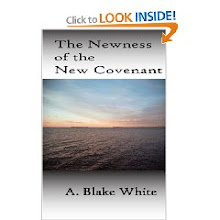
DISSECTION OF COVENANT THEOLOGY
Well, much more could be said. However, the simple point I am trying to make is that an argument insisting Genesis 3:14ff. composes a covenant seems to be a stretch. Thus, I would depart from CT here. At the same time I would strongly affirm that a Gospel promise was surely made in these verses. It just was not given in typical “covenant” fashion.
A Word About CT’s emphasis on the Unity of Scripture in General and the Gospel in Particular
This is certainly a strength of CT. Unlike, DT, which seems to divide Scripture up into so many segments (one begins to wonder if there is any unity and cohesiveness whatsoever in God’s sovereign decrees), CT robustly insists that Scripture is unified from top to bottom. There is one people of God. There is one way of salvation. Scripture never contradicts itself. CT sees Scripture as a tightly woven tapestry. If you pull on one thread, the whole thing will unravel before your eyes. In other words, things come together and make sense in God's divine Revelation. This must be true if we serve a logical God (which, by the way, we do… and shame on anyone who denies this). Thus, CT is a much more logical, Biblical, and Gospel-centered system. Nevertheless, it is not perfect. In fact, I have only pointed out some of its flaws above. I think there is a better theological system that seems to answer more questions, and at the same time remains more Biblical and Christ-centered. It is to that system in which we will turn in the next series of posts.
CONCLUSION
Allow me to make some brief comments about the overall system of covenant theology. Again, I am not pursuing a detailed critique. Yet, a few features of CT need to be examined in light of Scripture. These features will also be compared to DT and NCT (New Covenant Theology) to a certain extent in this post. This post will conclude our discussion of covenant theology.
A Word About CT’s View of the Church
CT has an interesting understanding of the identity of the Church. On the one hand, CT adherents agree with NCT proponents in seeing the church today as the true Israel of God. On the other hand, they disagree with NCT and DT because they say that the nation of Israel in the OT existed as the church. They conclude, therefore, that the church did not start on the Day of Pentecost (the day the Spirit of God was poured forth). Rather, they argue that the church has always been in existence. Part of their argument for this centers around a particular understanding of a word in the Septuagint translation of Scripture. The Septuagint is an ancient Greek translation of the original Hebrew of the Old Testament. In other words, it is simply the Old Testament Scriptures translated into Greek. Essentially, they argue that a Hebrew word, which means “assembly” is translated ekklesia in the Septuagint version. The Greek word ekklesia simply means “church”. In this version, “church” describes the nation of Israel in the wilderness. To me this is a historical argument, not a Biblical, or linguistic argument. It seems to me that the more Biblical argument would see the church beginning in the new covenant era, for Christ Himself said, “I will build my church, and the gates of Hades will not overpower it” (Matthew 16:18).
A Word About CT’s View of the Church
CT has an interesting understanding of the identity of the Church. On the one hand, CT adherents agree with NCT proponents in seeing the church today as the true Israel of God. On the other hand, they disagree with NCT and DT because they say that the nation of Israel in the OT existed as the church. They conclude, therefore, that the church did not start on the Day of Pentecost (the day the Spirit of God was poured forth). Rather, they argue that the church has always been in existence. Part of their argument for this centers around a particular understanding of a word in the Septuagint translation of Scripture. The Septuagint is an ancient Greek translation of the original Hebrew of the Old Testament. In other words, it is simply the Old Testament Scriptures translated into Greek. Essentially, they argue that a Hebrew word, which means “assembly” is translated ekklesia in the Septuagint version. The Greek word ekklesia simply means “church”. In this version, “church” describes the nation of Israel in the wilderness. To me this is a historical argument, not a Biblical, or linguistic argument. It seems to me that the more Biblical argument would see the church beginning in the new covenant era, for Christ Himself said, “I will build my church, and the gates of Hades will not overpower it” (Matthew 16:18).
On the other hand, it seems that CT rightly sees the church as the true Israel of God today. That is, they do not see two peoples of God, but one (contra DT). The church is “a chosen race, a royal priesthood, a holy nation, a people for God’s own possession” (I Peter 2:9). The Scriptural support for seeing the church as the fulfillment of all the OT prophecies concerning national Israel is abundant (Galatians 6:16; Romans 11; Acts 15:14-18; Revelation 3:9; Romans 2:28-29; and Philippians 3:3).
A Word About CT’s View of One Covenant of Grace
CT proponents argue for one covenant of grace (which flows from the covenant of redemption in eternity past among the members of the Godhead) in which exist various manifestations throughout redemptive history. Interestingly, much has to be assumed in order to argue that a covenant of grace took place in Genesis 3:8-19. When one reads the account there is, to be sure, a promise of Christ destroying Satan (the serpent of old…see Revelation 20:2; cf. Romans 16:20). “The Lord God said to the serpent, ‘Because you have done this, cursed are you more than all the cattle, and more than every beast of the field; on your belly you will go, and dust you will eat all the days of your life; and I will put enmity between you and the woman, and between your seed and her seed (Christ); He (Christ) shall bruise you on the head (the resurrection event), and you shall bruise him on the heel (the crucifixion event)” (Genesis 3:14-15). We find here a promise that is spoken to the serpent. Now surely, Adam and Eve overheard this promise. However, the promise does not prove that a covenant was made here. Who was the covenant made with (the parties involved)? Remember, these are words spoken directly to the serpent, not Adam (or Eve).
A Word About CT’s View of One Covenant of Grace
CT proponents argue for one covenant of grace (which flows from the covenant of redemption in eternity past among the members of the Godhead) in which exist various manifestations throughout redemptive history. Interestingly, much has to be assumed in order to argue that a covenant of grace took place in Genesis 3:8-19. When one reads the account there is, to be sure, a promise of Christ destroying Satan (the serpent of old…see Revelation 20:2; cf. Romans 16:20). “The Lord God said to the serpent, ‘Because you have done this, cursed are you more than all the cattle, and more than every beast of the field; on your belly you will go, and dust you will eat all the days of your life; and I will put enmity between you and the woman, and between your seed and her seed (Christ); He (Christ) shall bruise you on the head (the resurrection event), and you shall bruise him on the heel (the crucifixion event)” (Genesis 3:14-15). We find here a promise that is spoken to the serpent. Now surely, Adam and Eve overheard this promise. However, the promise does not prove that a covenant was made here. Who was the covenant made with (the parties involved)? Remember, these are words spoken directly to the serpent, not Adam (or Eve).
Well, much more could be said. However, the simple point I am trying to make is that an argument insisting Genesis 3:14ff. composes a covenant seems to be a stretch. Thus, I would depart from CT here. At the same time I would strongly affirm that a Gospel promise was surely made in these verses. It just was not given in typical “covenant” fashion.
A Word About CT’s emphasis on the Unity of Scripture in General and the Gospel in Particular
This is certainly a strength of CT. Unlike, DT, which seems to divide Scripture up into so many segments (one begins to wonder if there is any unity and cohesiveness whatsoever in God’s sovereign decrees), CT robustly insists that Scripture is unified from top to bottom. There is one people of God. There is one way of salvation. Scripture never contradicts itself. CT sees Scripture as a tightly woven tapestry. If you pull on one thread, the whole thing will unravel before your eyes. In other words, things come together and make sense in God's divine Revelation. This must be true if we serve a logical God (which, by the way, we do… and shame on anyone who denies this). Thus, CT is a much more logical, Biblical, and Gospel-centered system. Nevertheless, it is not perfect. In fact, I have only pointed out some of its flaws above. I think there is a better theological system that seems to answer more questions, and at the same time remains more Biblical and Christ-centered. It is to that system in which we will turn in the next series of posts.
CONCLUSION
If I may, allow me to conclude my commentary on CT by revealing its influence in my own spiritual journey. Those who hold to CT are Reformed men who have bravely and influentially propounded the doctrines of God’s glorious grace throughout church history. In other words, they are “Calvinists”. They stress God’s grace, and evaluate man’s will honestly in light of Scripture. They affirm the authority of Scripture. They understand that God gave Scripture to us in a logical manner. They try and make the Gospel the center of their system. It is because of these reasons (and many more) that my spiritual journey led me to discard my dispensational commitments for a more Biblical system in which I found CT to be. I cannot thank some of my college and seminary professors enough for their help in getting me to question my dispensational presuppositions. I appreciate the one-on-one time that a particular professor (Dr. Capshaw) took with me in order to convince me that theology was much bigger than end time prophecy charts and C.I. Schofield Study Bibles. He introduced me to the world of a gracious, and covenantal God. He chose to question my dispensational worldview both inside and outside of class. He did it in an almost angry manner. He was upset that so many of his students bought into dispensationalism simply because it was what we grew up with. He ignited in me and my friends a love for truth. He showed us the tough path in pursuing truth. There would be critics. There would be “traditionalists” who would not be open to any theology that questioned dispensationalism (and fundamentalism). But if anything was important- he argued-truth was! If anything was worth being criticized over, it was God's truth. Essentially, he argued (very simply) that God’s Word must have the final say. Most of all, he refused to accept a lazy attitude when it came to thinking through hard issues. To this day, I do not know if he was ever a classical covenant theologian. Indeed, I do not think he was. But I do know that he was closer to CT than DT. And more importantly, he did not believe in DT just because “everyone else did”. He shaped my theology more than he knows, and I gained a great appreciation for truth in his office, in the school dining hall, as well as in class. I have taken what he taught me (the importance of truth over all things), and have tried to apply it consistently to my whole belief system. He helped me think more Biblically. And I will admit, in the same way, that CT helps us think more Biblically and Christ-centered.
I say all of this to say that for a period of time I held to CT because I thought it answered more questions regarding the unity of God’s Divine Revelation than did DT. And for this I am very grateful. Yet, even with that being said, I do not believe CT holds answers to every theological question. I personally believe that the last system we will discuss (New Covenant Theology) answers the most questions that many seem to have about God and His Scriptures. So, it will be NCT to which we will direct our attention next.
Begging God to Help Me Become More Biblical,
Pastor Andy
I say all of this to say that for a period of time I held to CT because I thought it answered more questions regarding the unity of God’s Divine Revelation than did DT. And for this I am very grateful. Yet, even with that being said, I do not believe CT holds answers to every theological question. I personally believe that the last system we will discuss (New Covenant Theology) answers the most questions that many seem to have about God and His Scriptures. So, it will be NCT to which we will direct our attention next.
Begging God to Help Me Become More Biblical,
Pastor Andy








Amen!
ReplyDelete